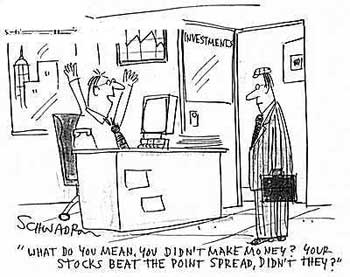For active traders and investors who enter and exit trades the more significant cost is likely to be the bid-offer spread, which you incur every time you make a trade. The spreads a spread betting company will quote you constantly change. The spread is based on the spread in the actual market for the underlying shares or index. When spread betting with spread bets that only last a single day, the spread closely reflects the cash price (the price of the underlying). With ones that expire a few months from now, they are based on the price of futures contracts. Note that the size of the bid-offer may vary from from provider to provider so it is worth shopping round.
 |
The prices for spread betting reflect the underlying market as well as interest and dividend adjustments. These premiums or discounts are mechanical and do not reflect a bullish or bearish view by a market maker. You are charged interest when spread betting because of the fact you've only put down a small proportion of the value of the position. You may have a position worth £10,000, but have only put down £1,000. The spread betting company assumes that you can be making money off that £9,000 you didn't have to put down, even if it's just in a savings account. So they'll charge you an interest charge. The dividend adjustment compensates for dividends the shares pay. If a share you've bet on is expected to pay out dividends at any time before the spread betting bet expires, the forward price will be reduced by the amount of the anticipated dividend. This reflects the fact that if you were holding the actual shares, you'd receive the dividend, but since you're not, you won't.
The spread is wider than the market spread, so that the spread betting company can make money. The extra spread also covers the costs of duty and commission, and the cost of holding the shares until the future date.
Let's pretend you want to make a spread bet on Prudential with the bet expiring in March. The cash price is 463 - 464p (bid-offer). The cash price is the price of shares on the stock market.
Interest charge: 5.1Market interest rates tend to be higher than the dividend yield of a typical share. For this reason, a one-year forward price for a share would stand at a premium to the spot price. In the case of UK shares, premiums for three months forward are less predictable because UK companies generally pay their annual dividends in two unequal installments. At current interest rates, the forward price for a quarter that contains an ex-dividend date may be at a discount to the spot price. In the case of some high-yielding shares, the discount may be substantial. The forward price for a quarter that contains no ex-dividend date will always be at a premium.
The content of this site is copyright 2016 Financial Spread Betting Ltd. Please contact us if you wish to reproduce any of it.